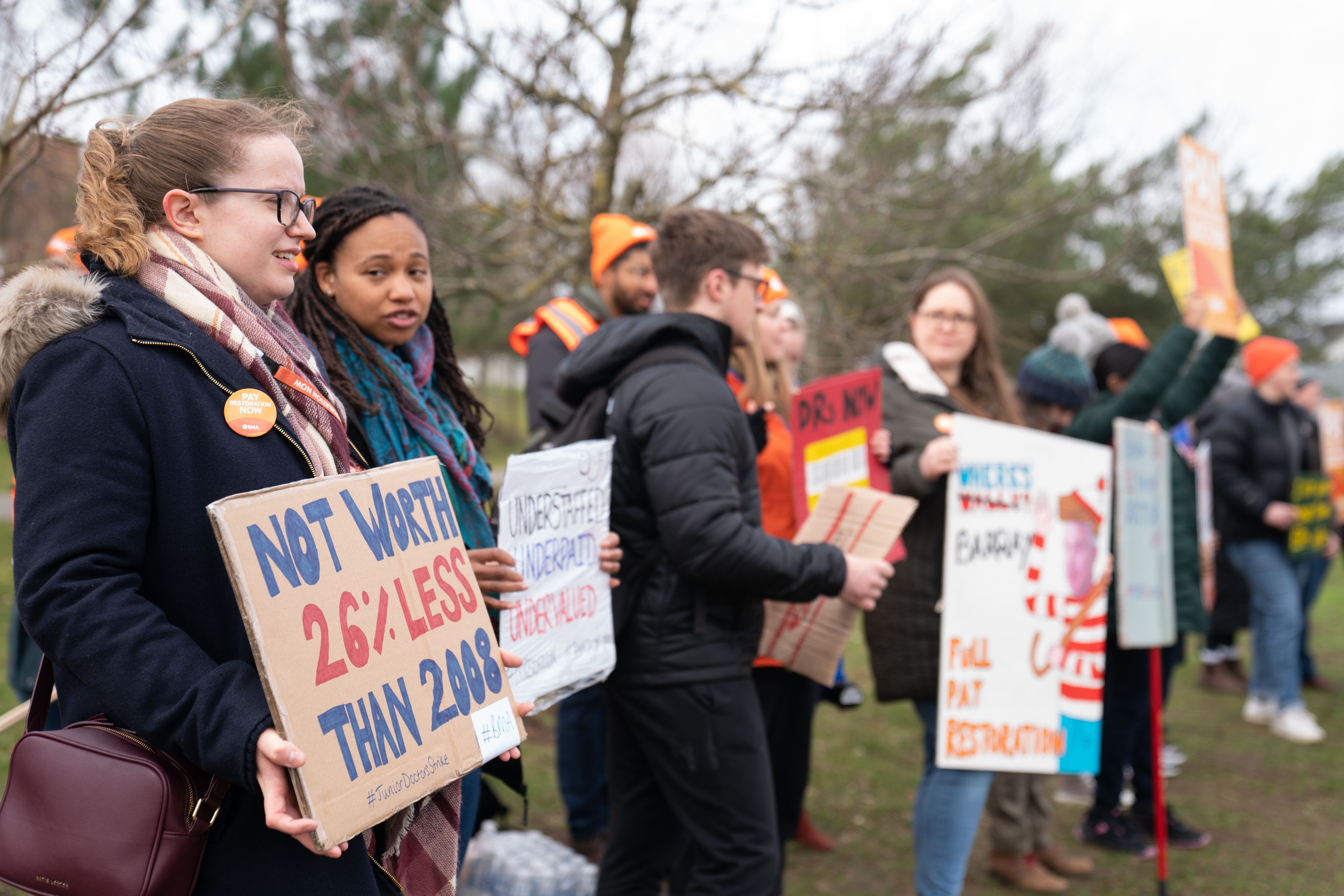Striking doctors could meet Health Secretary ‘as soon as this afternoon’
The British Medical Association says junior doctor pay has fallen in real terms by 26% since 2008/09 and reversing this would require a 35.3% rise.

Striking junior doctors could meet the Health Secretary as soon as Friday afternoon to discuss a pay rise, a member of the British Medical Association (BMA) said.
Dr Vivek Trivedi, co-chairman of the BMA’s junior doctors committee, told BBC Radio 4’s Today programme he hopes talks with Steve Barclay can begin soon.
The union is demanding “pay restoration” for junior doctors, who can have many years’ experience and make up about 45% of the medical workforce.
It says their pay has fallen in real terms by 26% since 2008/09 and reversing this would require a 35.3% pay rise.
Dr Trivedi said: “Our position has been that we are open to talk in good faith, meaningfully, at any time.
“We were ready to talk months ago. Our formal dispute started over 150 days ago and, again, that is just what I mean in that it is disappointing it has taken Steve Barclay so long to get to the negotiating table.
“I only hope that he does come with good faith and a mandate to negotiate.
“So far we haven’t arranged a time for this afternoon but there has been some correspondence between our offices so it does look like we’ll be able to set something up in the near future.”
Mr Barclay has called on junior doctors to follow the example of other health unions, who on Thursday said they will recommend a pay deal to NHS staff including nurses and ambulance workers.
“We have offered the same terms to the junior doctors that were accepted by the other trade unions and that is what I hope the junior doctors will respond to,” Mr Barclay said.
Thursday’s offer for other NHS staff – backed by the Royal College of Nursing, the GMB and Unison – includes a one-off lump sum for 2022/23 which rises in value up the NHS pay bands as well as a permanent 5% rise on all pay points for 2023/24.
It followed days of talks between health unions and the Government, raising hopes the long-running dispute could be brought to an end.
Deputy Prime Minister Dominic Raab said on Thursday the Government hopes to strike a similar pay deal with junior doctors.
Speaking to GB News, Mr Raab said: “The same offer is there. I think it would be the right thing to do for them to accept it. I hope they will.
There’s no way that the NHS can find one-and-a-half, two billion, two-and-a-half billion pounds without an impact on patient services or quality of care. We don’t have that money just lying around
“I think it is a good deal, which is fair, which recognises the situation they are in, recognises the need we all have got to tackle the backlog in the NHS.”
But questions were quickly raised about how the Treasury and Department of Health will fund the new offer.
Prime Minister Rishi Sunak insisted frontline services will “absolutely not” be affected by any final pay deal, while Mr Barclay said funding for the agreement will not come at the expense of patients.
Union members will now vote on whether to accept the deal for workers including nurses and paramedics and are expected to consider the detail over the coming days and weeks.
The offer has already seen planned strikes called off.
Unite said the offer is not one it can recommend but it is for members to make the final decision.
Meanwhile, Matthew Taylor, chief executive of the NHS Confederation, said the NHS does not have the money “just lying around” to fund the pay offer itself.
He said it will be “very important that we find out in the next few days how we’re going to meet this extra cost”.
Mr Taylor added: “The Government has said in its press release today (on Thursday) that the cost of this will be met without any impact on patient services or quality of care.
“Well, that’s a good guarantee. And we’ll want to see that being delivered on in the next few days.”
We wanted reassurance that this was additional money and it was not going to come out of NHS current budgets and that was the commitment we were given by the Government
“There’s no way that the NHS can find one-and-a-half, two billion, two-and-a-half billion pounds without an impact on patient services or quality of care. We don’t have that money just lying around,” he told Channel 4 News.
Rachel Harrison, national secretary of the GMB, told the Today programme on Friday that officials negotiating on behalf of NHS workers for a pay rise were told the proposed 5% pay increase from April would not be funded from the health service’s existing budgets.
She said: “That was one of the conditions that the GMB and some of the other unions put on the table before we even entered the room.
“We wanted reassurance that this was additional money and it was not going to come out of NHS current budgets and that was the commitment we were given by the Government.”
Bookmark popover
Removed from bookmarks